International Business Article Analysis Report - University Name
VerifiedAdded on 2022/09/09
|7
|1402
|13
Report
AI Summary
This report provides an analysis of a news article discussing the adverse impacts of current global issues, such as trade wars, on international business (IB). The report delves into the decline of globalization, the difficulties faced by IBs due to trade barriers and stringent policies, and the decrease in foreign direct investment. It discusses relevant IB theories and concepts, including the importance of absolute or comparative advantages, the CAGE framework, and the significance of connecting with the target market's society. The report also offers practical implications and suggestions, emphasizing the need for sustainable strategies that prioritize social, human, economic, and environmental factors. It suggests IBs assess competitors and avoid arbitraging operations, and focus on operating in countries with fewer trade barriers while building trust and goodwill with the society. The report highlights the need for a strong strategic plan based on the discussed issues and remedial measures.
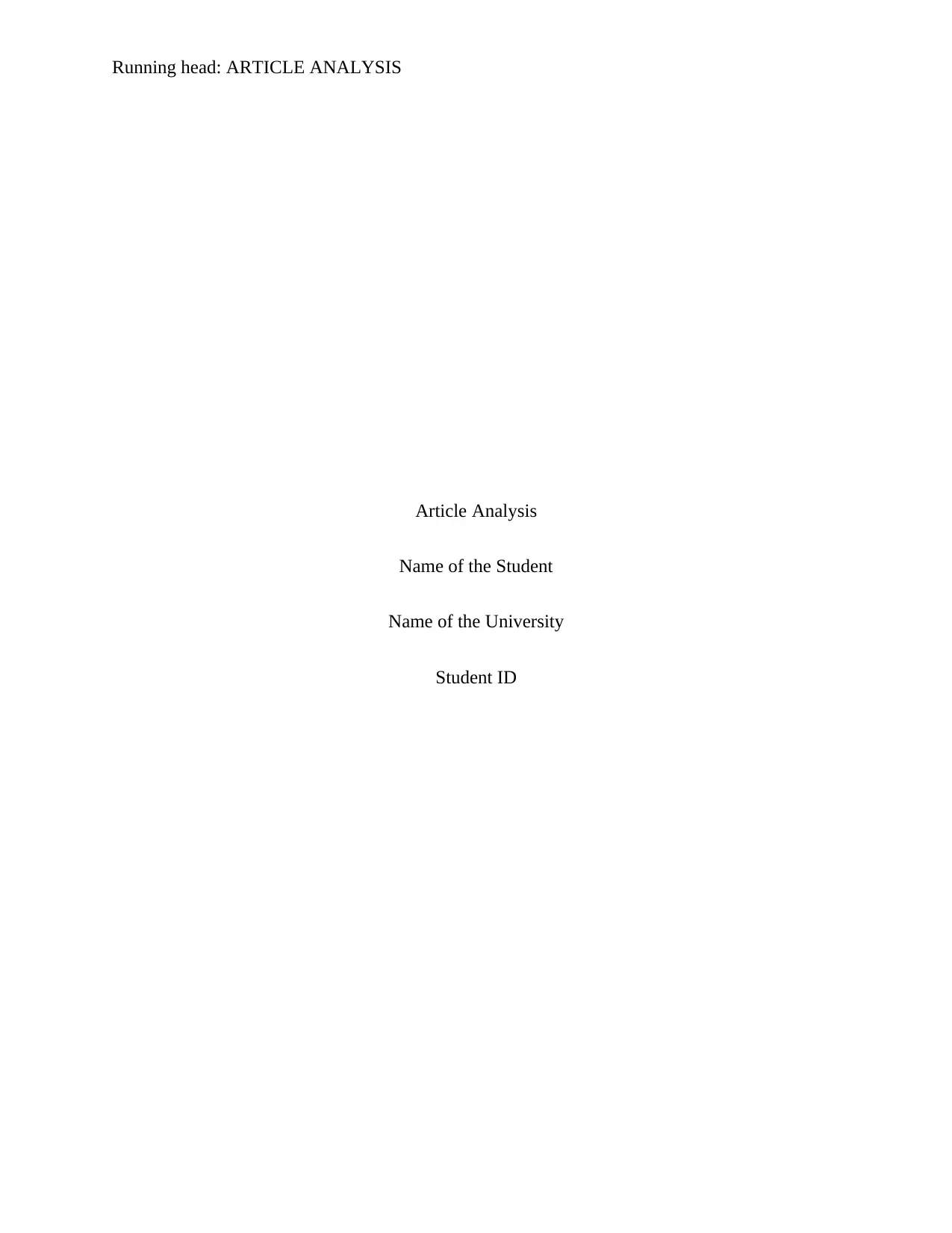
Running head: ARTICLE ANALYSIS
Article Analysis
Name of the Student
Name of the University
Student ID
Article Analysis
Name of the Student
Name of the University
Student ID
Paraphrase This Document
Need a fresh take? Get an instant paraphrase of this document with our AI Paraphraser
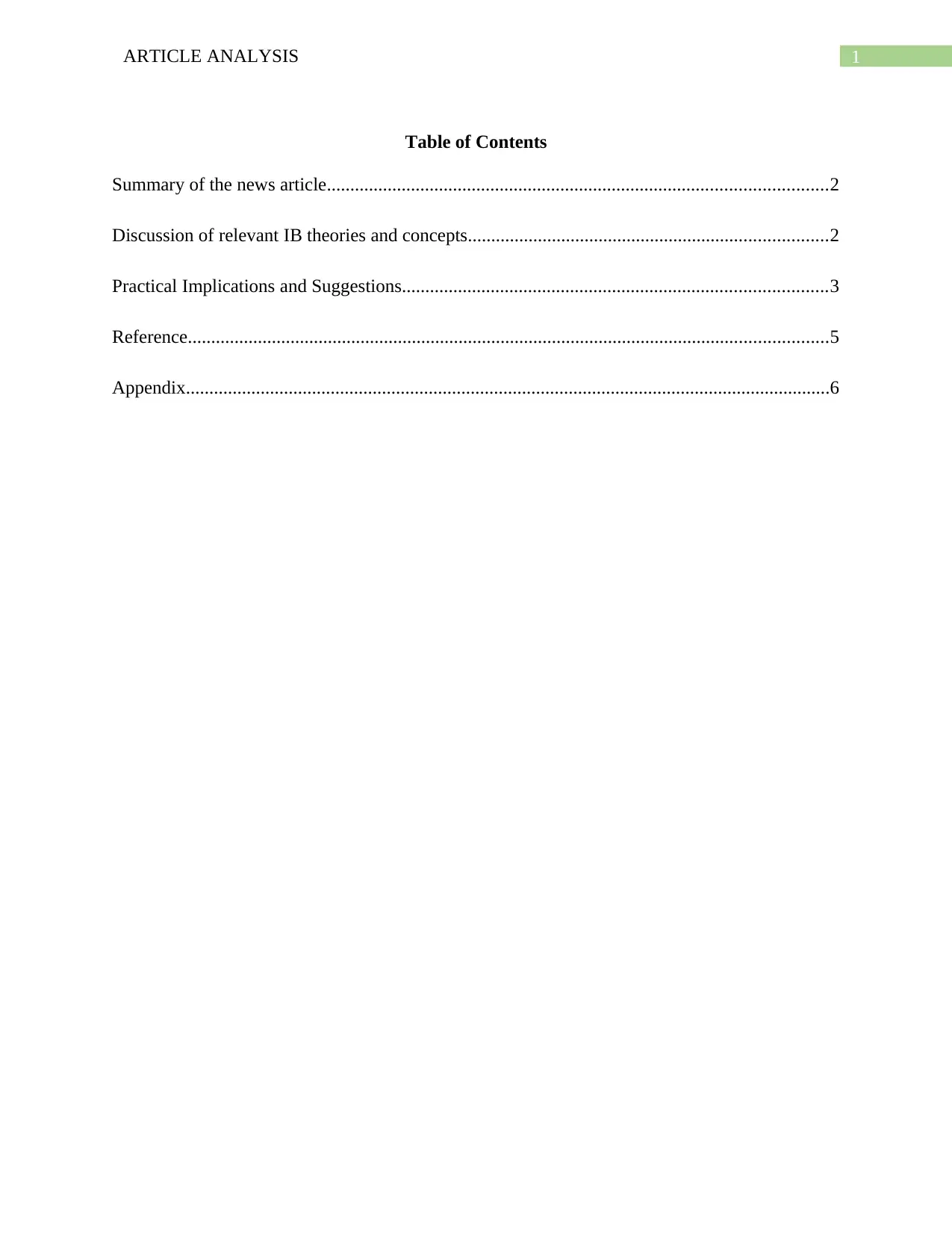
1ARTICLE ANALYSIS
Table of Contents
Summary of the news article...........................................................................................................2
Discussion of relevant IB theories and concepts.............................................................................2
Practical Implications and Suggestions...........................................................................................3
Reference.........................................................................................................................................5
Appendix..........................................................................................................................................6
Table of Contents
Summary of the news article...........................................................................................................2
Discussion of relevant IB theories and concepts.............................................................................2
Practical Implications and Suggestions...........................................................................................3
Reference.........................................................................................................................................5
Appendix..........................................................................................................................................6
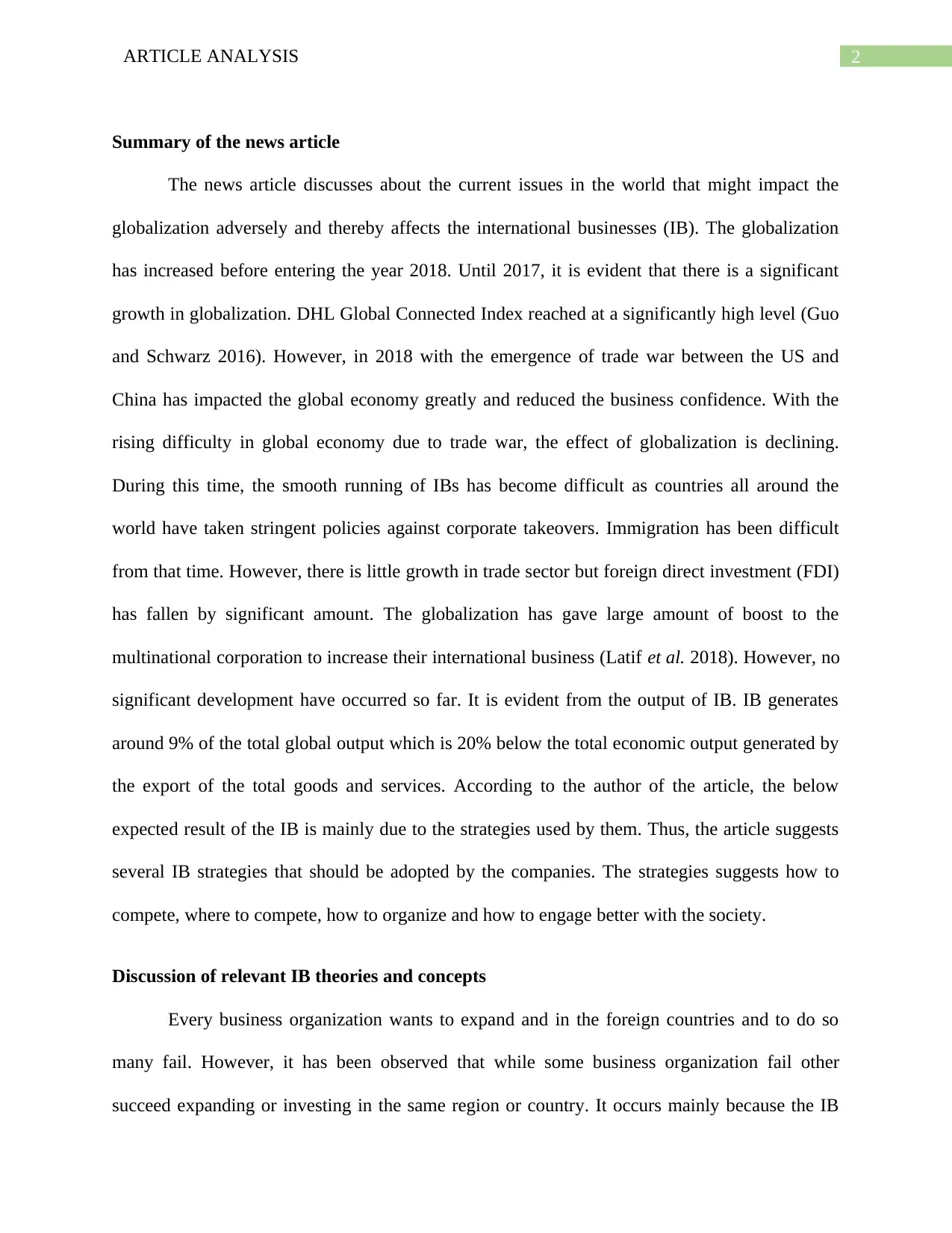
2ARTICLE ANALYSIS
Summary of the news article
The news article discusses about the current issues in the world that might impact the
globalization adversely and thereby affects the international businesses (IB). The globalization
has increased before entering the year 2018. Until 2017, it is evident that there is a significant
growth in globalization. DHL Global Connected Index reached at a significantly high level (Guo
and Schwarz 2016). However, in 2018 with the emergence of trade war between the US and
China has impacted the global economy greatly and reduced the business confidence. With the
rising difficulty in global economy due to trade war, the effect of globalization is declining.
During this time, the smooth running of IBs has become difficult as countries all around the
world have taken stringent policies against corporate takeovers. Immigration has been difficult
from that time. However, there is little growth in trade sector but foreign direct investment (FDI)
has fallen by significant amount. The globalization has gave large amount of boost to the
multinational corporation to increase their international business (Latif et al. 2018). However, no
significant development have occurred so far. It is evident from the output of IB. IB generates
around 9% of the total global output which is 20% below the total economic output generated by
the export of the total goods and services. According to the author of the article, the below
expected result of the IB is mainly due to the strategies used by them. Thus, the article suggests
several IB strategies that should be adopted by the companies. The strategies suggests how to
compete, where to compete, how to organize and how to engage better with the society.
Discussion of relevant IB theories and concepts
Every business organization wants to expand and in the foreign countries and to do so
many fail. However, it has been observed that while some business organization fail other
succeed expanding or investing in the same region or country. It occurs mainly because the IB
Summary of the news article
The news article discusses about the current issues in the world that might impact the
globalization adversely and thereby affects the international businesses (IB). The globalization
has increased before entering the year 2018. Until 2017, it is evident that there is a significant
growth in globalization. DHL Global Connected Index reached at a significantly high level (Guo
and Schwarz 2016). However, in 2018 with the emergence of trade war between the US and
China has impacted the global economy greatly and reduced the business confidence. With the
rising difficulty in global economy due to trade war, the effect of globalization is declining.
During this time, the smooth running of IBs has become difficult as countries all around the
world have taken stringent policies against corporate takeovers. Immigration has been difficult
from that time. However, there is little growth in trade sector but foreign direct investment (FDI)
has fallen by significant amount. The globalization has gave large amount of boost to the
multinational corporation to increase their international business (Latif et al. 2018). However, no
significant development have occurred so far. It is evident from the output of IB. IB generates
around 9% of the total global output which is 20% below the total economic output generated by
the export of the total goods and services. According to the author of the article, the below
expected result of the IB is mainly due to the strategies used by them. Thus, the article suggests
several IB strategies that should be adopted by the companies. The strategies suggests how to
compete, where to compete, how to organize and how to engage better with the society.
Discussion of relevant IB theories and concepts
Every business organization wants to expand and in the foreign countries and to do so
many fail. However, it has been observed that while some business organization fail other
succeed expanding or investing in the same region or country. It occurs mainly because the IB
⊘ This is a preview!⊘
Do you want full access?
Subscribe today to unlock all pages.

Trusted by 1+ million students worldwide
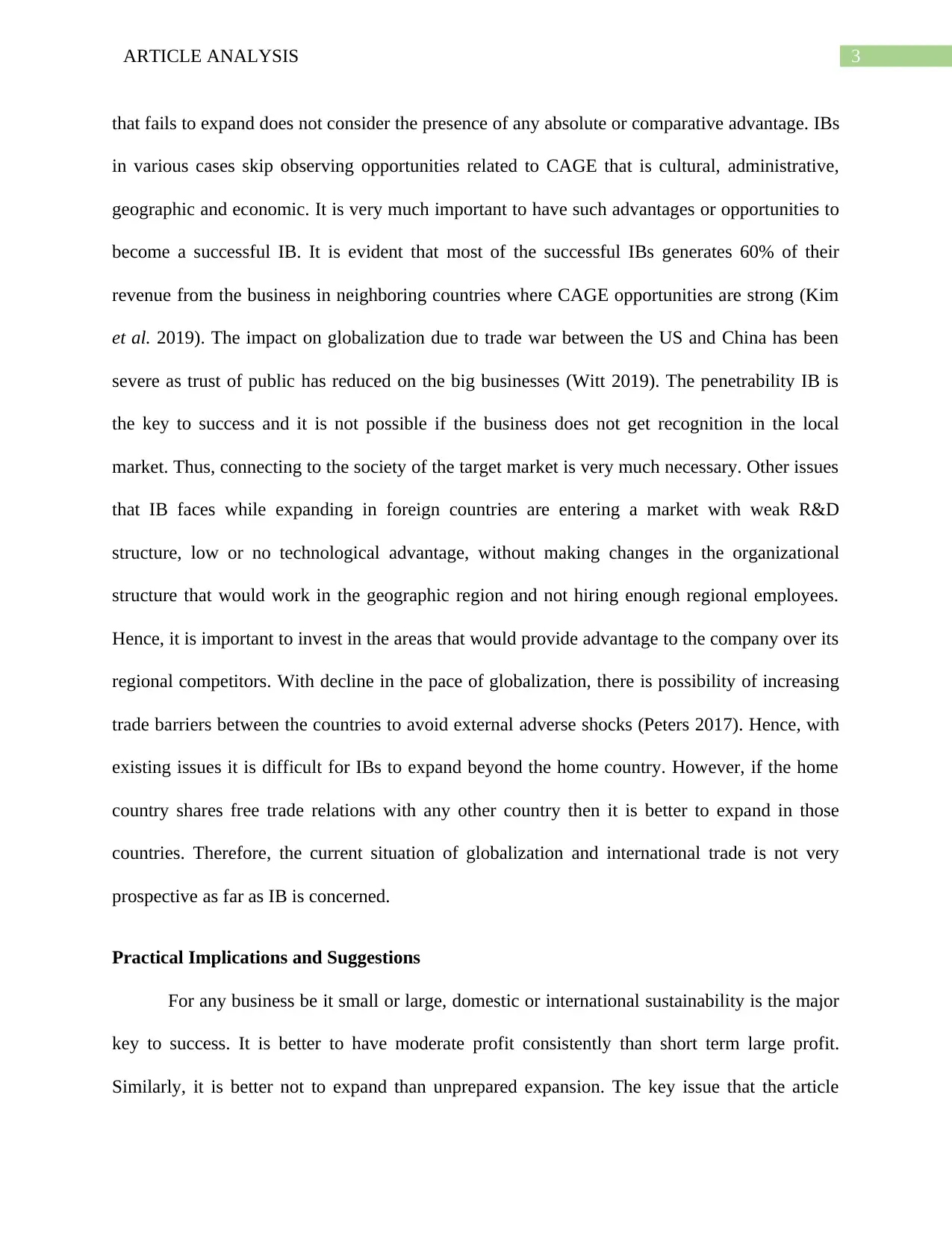
3ARTICLE ANALYSIS
that fails to expand does not consider the presence of any absolute or comparative advantage. IBs
in various cases skip observing opportunities related to CAGE that is cultural, administrative,
geographic and economic. It is very much important to have such advantages or opportunities to
become a successful IB. It is evident that most of the successful IBs generates 60% of their
revenue from the business in neighboring countries where CAGE opportunities are strong (Kim
et al. 2019). The impact on globalization due to trade war between the US and China has been
severe as trust of public has reduced on the big businesses (Witt 2019). The penetrability IB is
the key to success and it is not possible if the business does not get recognition in the local
market. Thus, connecting to the society of the target market is very much necessary. Other issues
that IB faces while expanding in foreign countries are entering a market with weak R&D
structure, low or no technological advantage, without making changes in the organizational
structure that would work in the geographic region and not hiring enough regional employees.
Hence, it is important to invest in the areas that would provide advantage to the company over its
regional competitors. With decline in the pace of globalization, there is possibility of increasing
trade barriers between the countries to avoid external adverse shocks (Peters 2017). Hence, with
existing issues it is difficult for IBs to expand beyond the home country. However, if the home
country shares free trade relations with any other country then it is better to expand in those
countries. Therefore, the current situation of globalization and international trade is not very
prospective as far as IB is concerned.
Practical Implications and Suggestions
For any business be it small or large, domestic or international sustainability is the major
key to success. It is better to have moderate profit consistently than short term large profit.
Similarly, it is better not to expand than unprepared expansion. The key issue that the article
that fails to expand does not consider the presence of any absolute or comparative advantage. IBs
in various cases skip observing opportunities related to CAGE that is cultural, administrative,
geographic and economic. It is very much important to have such advantages or opportunities to
become a successful IB. It is evident that most of the successful IBs generates 60% of their
revenue from the business in neighboring countries where CAGE opportunities are strong (Kim
et al. 2019). The impact on globalization due to trade war between the US and China has been
severe as trust of public has reduced on the big businesses (Witt 2019). The penetrability IB is
the key to success and it is not possible if the business does not get recognition in the local
market. Thus, connecting to the society of the target market is very much necessary. Other issues
that IB faces while expanding in foreign countries are entering a market with weak R&D
structure, low or no technological advantage, without making changes in the organizational
structure that would work in the geographic region and not hiring enough regional employees.
Hence, it is important to invest in the areas that would provide advantage to the company over its
regional competitors. With decline in the pace of globalization, there is possibility of increasing
trade barriers between the countries to avoid external adverse shocks (Peters 2017). Hence, with
existing issues it is difficult for IBs to expand beyond the home country. However, if the home
country shares free trade relations with any other country then it is better to expand in those
countries. Therefore, the current situation of globalization and international trade is not very
prospective as far as IB is concerned.
Practical Implications and Suggestions
For any business be it small or large, domestic or international sustainability is the major
key to success. It is better to have moderate profit consistently than short term large profit.
Similarly, it is better not to expand than unprepared expansion. The key issue that the article
Paraphrase This Document
Need a fresh take? Get an instant paraphrase of this document with our AI Paraphraser
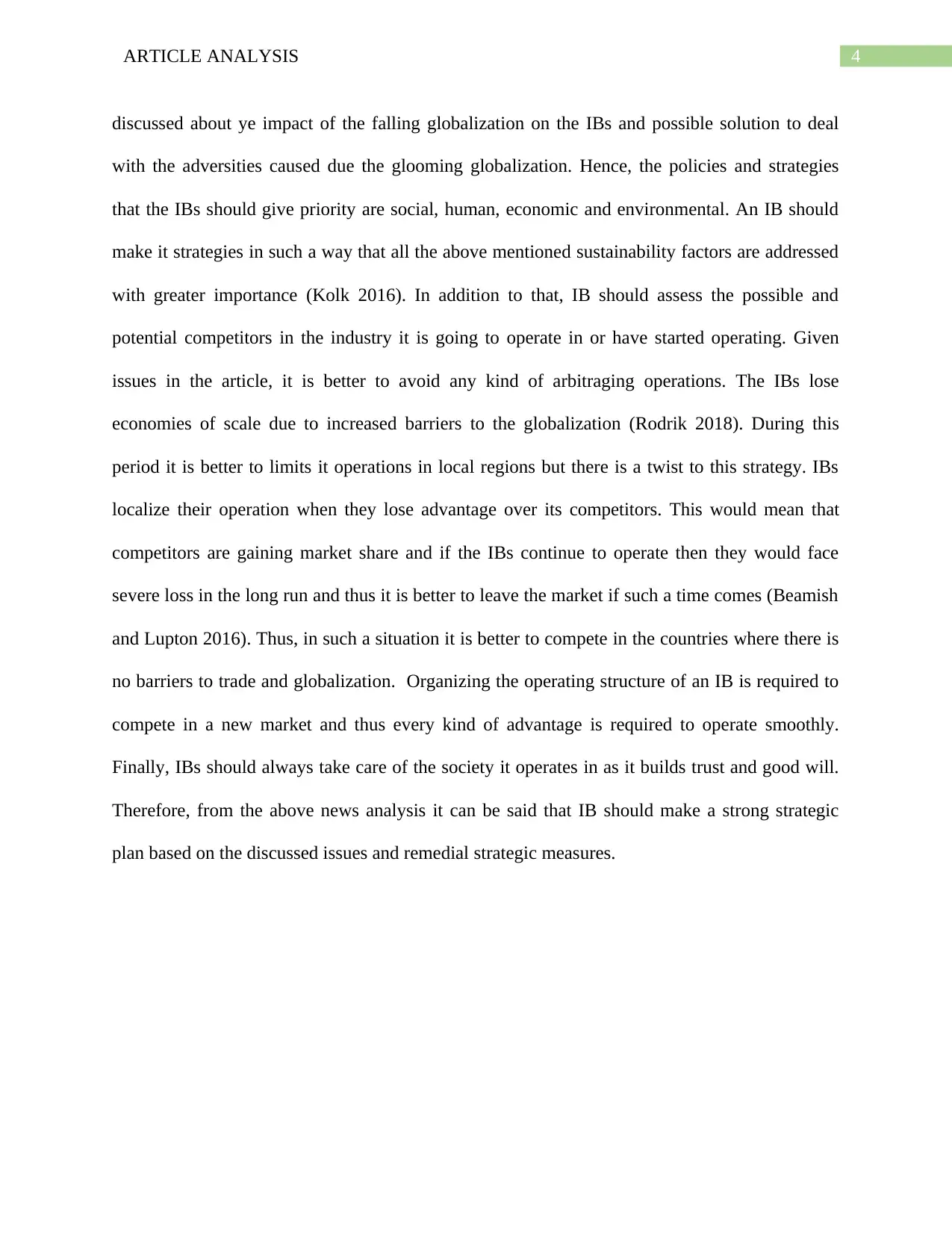
4ARTICLE ANALYSIS
discussed about ye impact of the falling globalization on the IBs and possible solution to deal
with the adversities caused due the glooming globalization. Hence, the policies and strategies
that the IBs should give priority are social, human, economic and environmental. An IB should
make it strategies in such a way that all the above mentioned sustainability factors are addressed
with greater importance (Kolk 2016). In addition to that, IB should assess the possible and
potential competitors in the industry it is going to operate in or have started operating. Given
issues in the article, it is better to avoid any kind of arbitraging operations. The IBs lose
economies of scale due to increased barriers to the globalization (Rodrik 2018). During this
period it is better to limits it operations in local regions but there is a twist to this strategy. IBs
localize their operation when they lose advantage over its competitors. This would mean that
competitors are gaining market share and if the IBs continue to operate then they would face
severe loss in the long run and thus it is better to leave the market if such a time comes (Beamish
and Lupton 2016). Thus, in such a situation it is better to compete in the countries where there is
no barriers to trade and globalization. Organizing the operating structure of an IB is required to
compete in a new market and thus every kind of advantage is required to operate smoothly.
Finally, IBs should always take care of the society it operates in as it builds trust and good will.
Therefore, from the above news analysis it can be said that IB should make a strong strategic
plan based on the discussed issues and remedial strategic measures.
discussed about ye impact of the falling globalization on the IBs and possible solution to deal
with the adversities caused due the glooming globalization. Hence, the policies and strategies
that the IBs should give priority are social, human, economic and environmental. An IB should
make it strategies in such a way that all the above mentioned sustainability factors are addressed
with greater importance (Kolk 2016). In addition to that, IB should assess the possible and
potential competitors in the industry it is going to operate in or have started operating. Given
issues in the article, it is better to avoid any kind of arbitraging operations. The IBs lose
economies of scale due to increased barriers to the globalization (Rodrik 2018). During this
period it is better to limits it operations in local regions but there is a twist to this strategy. IBs
localize their operation when they lose advantage over its competitors. This would mean that
competitors are gaining market share and if the IBs continue to operate then they would face
severe loss in the long run and thus it is better to leave the market if such a time comes (Beamish
and Lupton 2016). Thus, in such a situation it is better to compete in the countries where there is
no barriers to trade and globalization. Organizing the operating structure of an IB is required to
compete in a new market and thus every kind of advantage is required to operate smoothly.
Finally, IBs should always take care of the society it operates in as it builds trust and good will.
Therefore, from the above news analysis it can be said that IB should make a strong strategic
plan based on the discussed issues and remedial strategic measures.
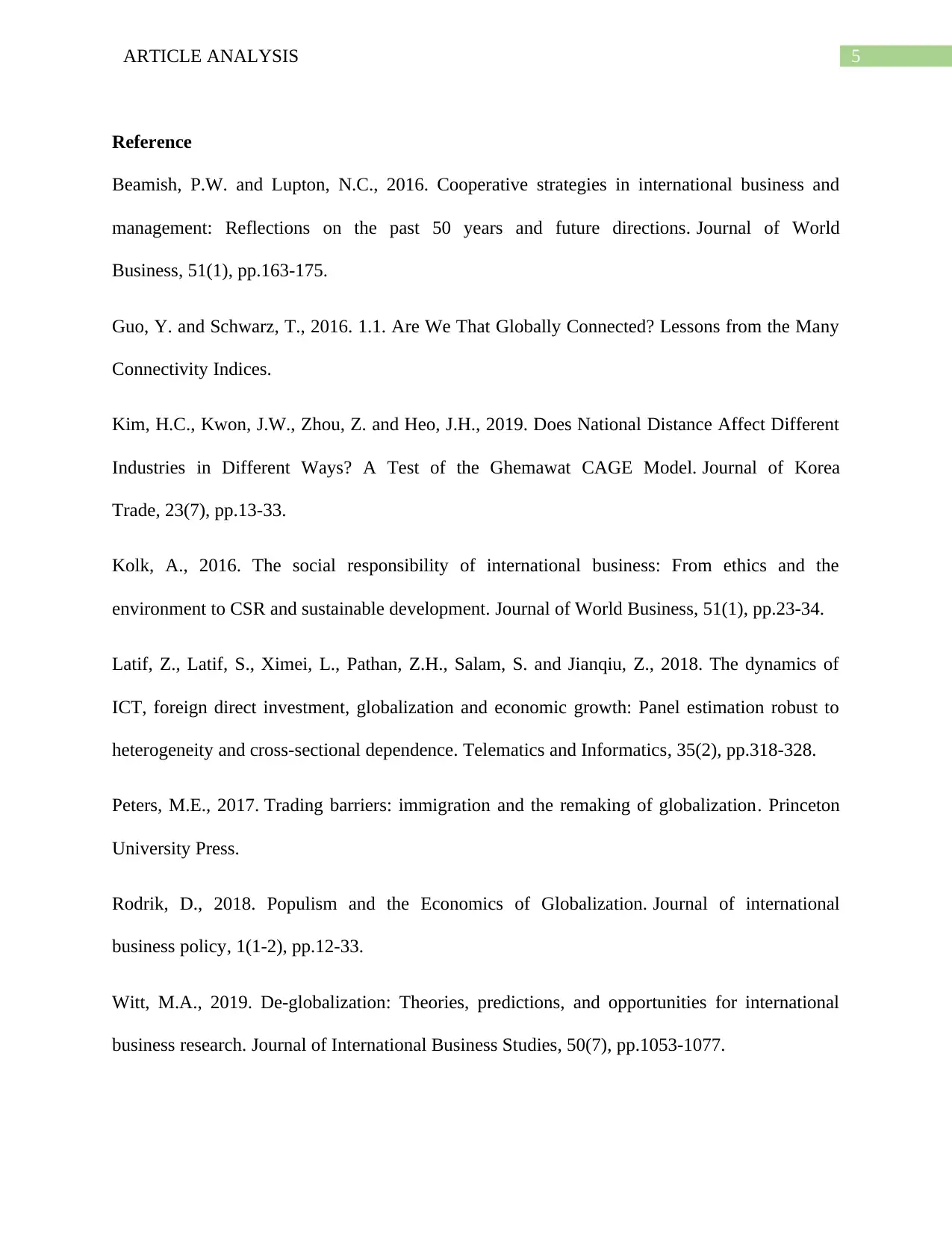
5ARTICLE ANALYSIS
Reference
Beamish, P.W. and Lupton, N.C., 2016. Cooperative strategies in international business and
management: Reflections on the past 50 years and future directions. Journal of World
Business, 51(1), pp.163-175.
Guo, Y. and Schwarz, T., 2016. 1.1. Are We That Globally Connected? Lessons from the Many
Connectivity Indices.
Kim, H.C., Kwon, J.W., Zhou, Z. and Heo, J.H., 2019. Does National Distance Affect Different
Industries in Different Ways? A Test of the Ghemawat CAGE Model. Journal of Korea
Trade, 23(7), pp.13-33.
Kolk, A., 2016. The social responsibility of international business: From ethics and the
environment to CSR and sustainable development. Journal of World Business, 51(1), pp.23-34.
Latif, Z., Latif, S., Ximei, L., Pathan, Z.H., Salam, S. and Jianqiu, Z., 2018. The dynamics of
ICT, foreign direct investment, globalization and economic growth: Panel estimation robust to
heterogeneity and cross-sectional dependence. Telematics and Informatics, 35(2), pp.318-328.
Peters, M.E., 2017. Trading barriers: immigration and the remaking of globalization. Princeton
University Press.
Rodrik, D., 2018. Populism and the Economics of Globalization. Journal of international
business policy, 1(1-2), pp.12-33.
Witt, M.A., 2019. De-globalization: Theories, predictions, and opportunities for international
business research. Journal of International Business Studies, 50(7), pp.1053-1077.
Reference
Beamish, P.W. and Lupton, N.C., 2016. Cooperative strategies in international business and
management: Reflections on the past 50 years and future directions. Journal of World
Business, 51(1), pp.163-175.
Guo, Y. and Schwarz, T., 2016. 1.1. Are We That Globally Connected? Lessons from the Many
Connectivity Indices.
Kim, H.C., Kwon, J.W., Zhou, Z. and Heo, J.H., 2019. Does National Distance Affect Different
Industries in Different Ways? A Test of the Ghemawat CAGE Model. Journal of Korea
Trade, 23(7), pp.13-33.
Kolk, A., 2016. The social responsibility of international business: From ethics and the
environment to CSR and sustainable development. Journal of World Business, 51(1), pp.23-34.
Latif, Z., Latif, S., Ximei, L., Pathan, Z.H., Salam, S. and Jianqiu, Z., 2018. The dynamics of
ICT, foreign direct investment, globalization and economic growth: Panel estimation robust to
heterogeneity and cross-sectional dependence. Telematics and Informatics, 35(2), pp.318-328.
Peters, M.E., 2017. Trading barriers: immigration and the remaking of globalization. Princeton
University Press.
Rodrik, D., 2018. Populism and the Economics of Globalization. Journal of international
business policy, 1(1-2), pp.12-33.
Witt, M.A., 2019. De-globalization: Theories, predictions, and opportunities for international
business research. Journal of International Business Studies, 50(7), pp.1053-1077.
⊘ This is a preview!⊘
Do you want full access?
Subscribe today to unlock all pages.

Trusted by 1+ million students worldwide

6ARTICLE ANALYSIS
Appendix
https://hbr.org/2019/02/the-state-of-globalization-in-2019-and-what-it-means-for-strategists
Appendix
https://hbr.org/2019/02/the-state-of-globalization-in-2019-and-what-it-means-for-strategists
1 out of 7
Related Documents
Your All-in-One AI-Powered Toolkit for Academic Success.
+13062052269
info@desklib.com
Available 24*7 on WhatsApp / Email
![[object Object]](/_next/static/media/star-bottom.7253800d.svg)
Unlock your academic potential
Copyright © 2020–2026 A2Z Services. All Rights Reserved. Developed and managed by ZUCOL.




